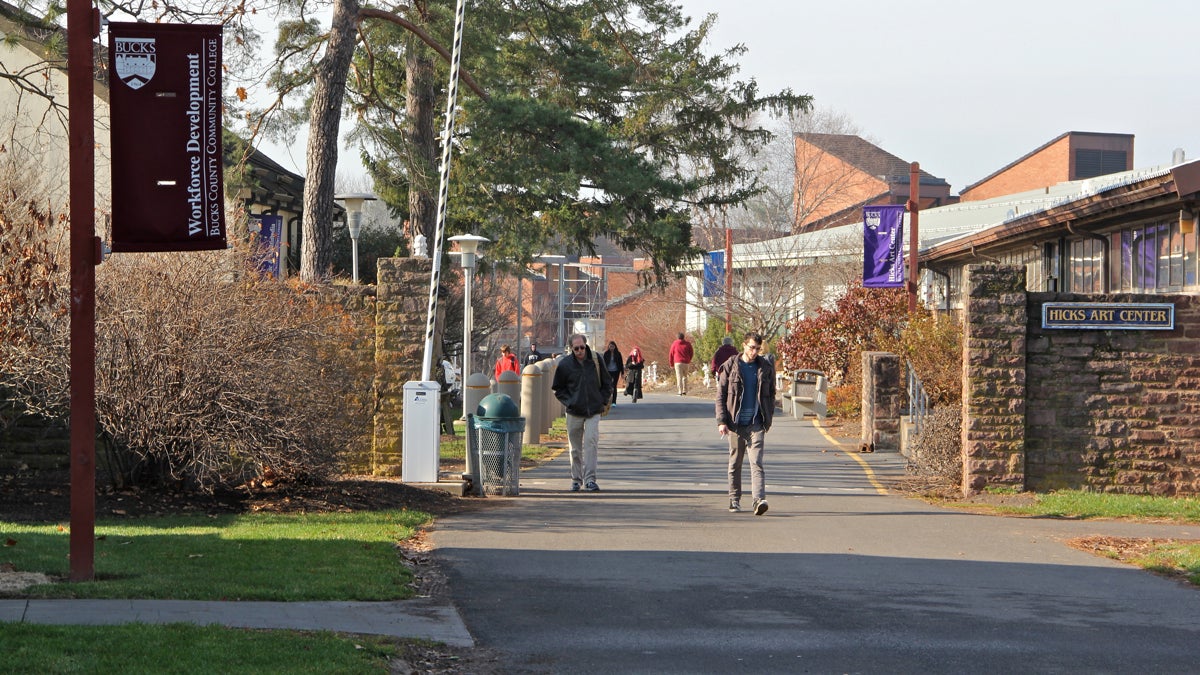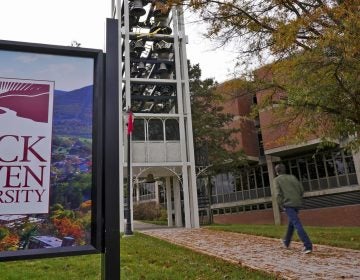Tuition-free community colleges, public universities proposed in Pa.
State Sen. Vincent Hughes intends to introduce his Pennsylvania Promise legislation on April 16.

Bucks County Community College, Newtown campus. (Emma Lee/WHYY)
Today, American students are shouldering most of the cost to attend public universities and colleges.
Meanwhile, Pennsylvania has long lagged behind the rest of the country in spending on higher education. But state legislators are now looking at ways to make college more affordable for students in the Keystone State.
As part of that effort, state Sen. Vince Hughes, D-Philadelphia, plans to introduce a bill would cover two years of tuition and fees for recent high school graduates attending one of the state’s 14 community colleges. It would also cover four years of tuition and fees at a state-owned university for students with a family income of $110,000 or less per year. Students whose family income is $48,000 or less would be eligible for assistance with costs associated with room and board.
The legislation would also provide grants to adult learners who are seeking additional credentials, including certification and college credit.
It would be administered by the Pennsylvania Higher Education Assistance Agency and cover “last dollar,” the remaining amount after all other federal, state, and institutional grants are awarded to a student.
Hughes says it’s the right thing for Pennsylvania to do as new jobs are requiring workers to have completed at least some college courses.
“The research indicates that by 2020 — less than a year and a half from now — 63 percent of all of the jobs that’ll be created will require some level of post-high school education,” Hughes said.
He said the commonwealth will not be ready for the 21st century until all Pennsylvanians can get the education they need.
“This is a priority, as I said both for individual families and it’s a priority for the state of Pennsylvania,” Hughes said. “This is the way to invest in Pennsylvania to reap the rewards for years, if not decades, in fact, for generations to come.”
Across the country, 16 states already have tuition-free college programs, and some state lawmakers hope to add Pennsylvania to that list.
“We are the 47th in the nation in terms of state support for young people to go to college. We’ve got to have a new path, a new way for Pennsylvania students to get access to college,” Hughes said.
Currently collecting co-sponsors, Hughes’ bill is based on findings from “The Pennsylvania Promise,” a report released in January from the Keystone Research Center and the Pennsylvania Budget and Policy Center.
At a news conference in January, state Rep. James Roebuck, minority chair of the House Education Committee, noted the “fierce urgency” of higher education need for individuals and the commonwealth.
“The future of the state’s economy and workforce are dependent upon highly trained, qualified employees,” he said. “Today, college is not a privilege, rather an expectation in order to get a good job.”
State Rep. Jordan Harris, chair of the Pennsylvania Legislative Black Caucus, said it’s extremely difficult for young people to attend college now.
“The story that many our young people across this commonwealth face is that — even if they go to school, even if they work hard, even if they stay up late at night and do all the work that is required of them — obtaining a college degree may still be unobtainable to them,” he said. “Not because of their lack of effort, not because of their lack of intellect, but because of the dollars and cents that is applied to their parents’ paycheck, to the dollars and cents that they do not have to afford that education.”
Without accessible quality education, Harris said, Pennsylvania will continue to slide further behind many other states.
“This is about humanity, and humanity says that when our young people put in the work, they deserve this education,” he said.
PA Student Power, a statewide student advocacy group, has a “College for All PA” campaign calling on all candidates and elected officials to sign a pledge to support the concept.
Rallies supporting Hughes’ tuition measure are planned across the state, including one on Thursday at West Chester University.
—
Correction: A previous version of this story misstated the types of colleges and universities where tuition would be covered for some students under the proposed legislation.
WHYY is your source for fact-based, in-depth journalism and information. As a nonprofit organization, we rely on financial support from readers like you. Please give today.



